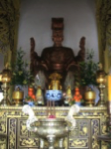Tran Nhan Tong Poems > My poetic side
 Trần Nhân Tông was a 13th century Vietnamese poet and ruler of his country who had inherited the throne from his father and who then, in turn, passed it on to his own son Trần Anh Tông in 1294. He had served his country well during three momentous Mongol invasions, acting as joint supreme commander alongside his father, Retired Emperor Thánh Tông. The victories won by the Dại Việt during these campaigns ensured a long period of relatively prosperous peace for the country.
Trần Nhân Tông was a 13th century Vietnamese poet and ruler of his country who had inherited the throne from his father and who then, in turn, passed it on to his own son Trần Anh Tông in 1294. He had served his country well during three momentous Mongol invasions, acting as joint supreme commander alongside his father, Retired Emperor Thánh Tông. The victories won by the Dại Việt during these campaigns ensured a long period of relatively prosperous peace for the country.
He was born Trần Khâm on the 11th November 1258, the son of the Emperor Trần Thánh Tông and Empress Thiên Cảm Trần Thị Thiều. It was clear from an early age that the young prince would follow in his father’s footsteps, especially where education was concerned. He had the Emperor’s poetry to help him in the first instance, in particular a publication called Di hậu lục. Then a mandarin and general by the name of Lê Phụ Trần was appointed to ensure that the boy learned well. He was assisted in this task by famous Vietnamese scholars such as Nguyễn Sĩ Cố and Nguyễn Thánh Huấn.
At the age of twenty, Tran Khâm succeeded to the throne, and from then on became known as King Trần Nhân Tông . These were difficult times with Mongol invaders constantly chipping away at their borders, endeavouring to overrun the country. With the help of his father though, Retired Emperor Trần Thánh Tông, Vietnam triumphed, fighting off three major invasions, and the country could eventually enjoy peace and a degree of prosperity for a while. The Vietnamese people will most certainly have had enough of war, famine and natural disasters by then.
Once again, mirroring the actions of his father, Trần Nhân passed on the throne of his country to his first son in 1293. The retired king then pursued a life of Buddhist worship, meditation and writing. It is unclear how large his poetic output was, or when he wrote, but here is one that was written about those tumultuous years of war. It is a powerful piece simply called Death:

Having passed on the Emperor’s high office to his son, he became a cloistered, retired emperor and is remembered in the history books as a wise sage. He founded what became the only native school of Buddhism in Vietnam. This indigenous Zen sect was called Trúc Lâm but, unfortunately, the sect waned in popularity as Confucianism soon began to dominate around the royal courts. An attempt was made to revive it in the 18th century by a scholar named Ngô Thì Nhậm whose aim was to harmonise

It seems that there is little evidence of Tran Nhan’s poetic output but it is clear that he was a scholarly man, like his father. His name certainly lives in modern memories as there are major streets with his name on in virtually every Vietnamese city.
Trần Nhân Tông died on the 16th December 1308 at the age of 50.
